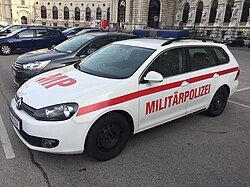This article needs additional citations for verification .(November 2019) |
In Austria, law enforcement is the responsibility of the Directorate General for Public Security, a subdivision of the Federal Ministry of the Interior located at Herrengasse 7 in Vienna. Over 20,000 police officers are on duty in the Federal Police at more than 1,000 police stations.[ citation needed ] On lakes and rivers the federal police has over 70 boats and other craft to act as the water police.[ citation needed ]
Contents
- Law enforcement agencies
- Federal
- State
- Municipalities
- Requirements for police officers
- See also
- References
- External links




